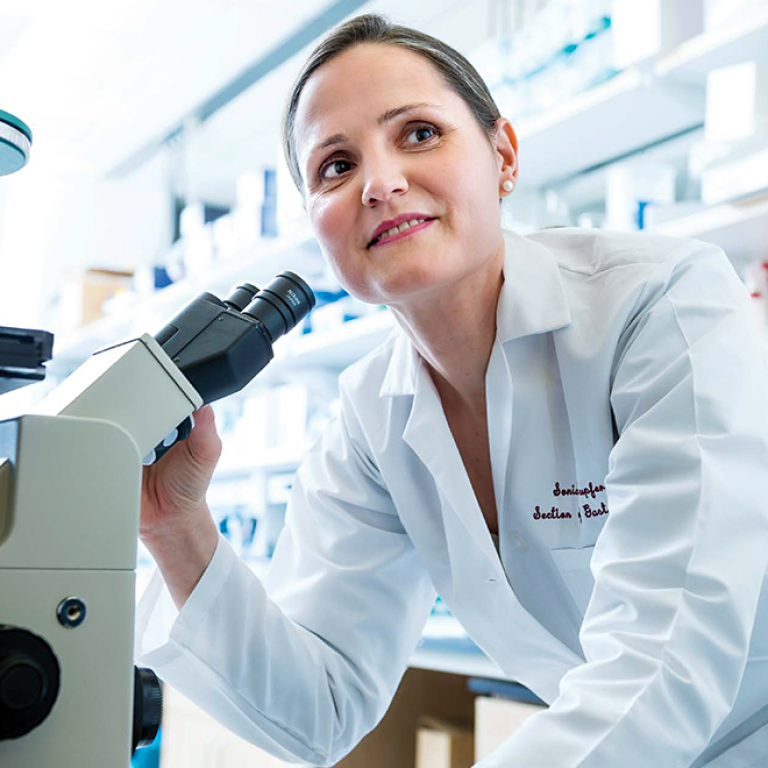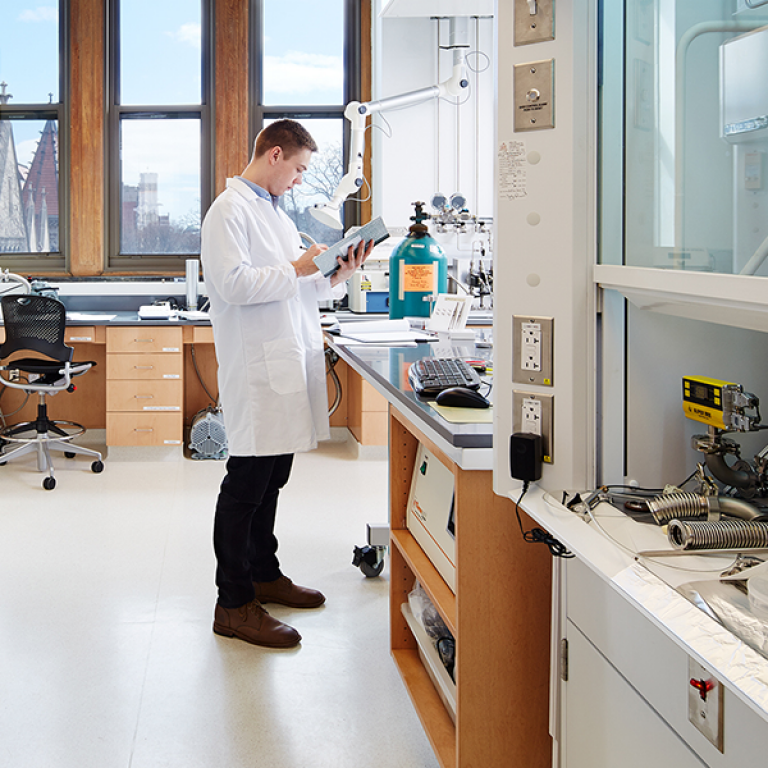Earning a doctorate in the biological sciences can mean stepping into an unknown world. PhD-trained scientists may be equipped to succeed in a variety of careers — ranging from pharmaceutical research to roles in consulting, communications and public policy — but the paths to these and other careers may be unfamiliar or unclear to graduates.
For the last decade, doctoral students and postdoctoral scientists in the Biological Sciences Division at the University of Chicago have had a specialized resource. The myCHOICE program is a comprehensive effort to expose scientists-in-training to a pipeline of potential jobs beyond academia — and to help them leverage their unique skills in the market.
This story appeared in Medicine on the Midway magazine. Read the Fall 2024 issue here.
“As the economy and workforce matures and changes, PhD-trained scientists can contribute attention to detail, outside-the-box thinking and ingrained determination to produce a high-quality result, all of which is recognized by employers,” said Abby Stayart, PhD, senior program director for myCHOICE.
The program’s broad focus, she adds, “has carved out permission for trainees to consider their skills and their relevance to careers that were not previously represented in academic training.”
Launched in 2014 via a grant from the National Institutes of Health — at a time when data showed that more than half of recent PhD graduates were pursuing careers outside of academia — myCHOICE was one of 17 NIH-funded programs at universities across the country designed to help trainees transition into careers that fit their skills and interests.
Today, myCHOICE is one of the few programs created by that NIH funding still in operation, and its events and programs regularly attract more than 1,000 attendees annually.
Career guidance offers ‘hyper-valuable’ asset
The ambiguities that students face when searching for jobs aren’t lost on educators, said David Kovar, PhD, Associate Dean for Graduate Education in the BSD.
“All of us faculty are very well positioned to provide students advice on how to pursue a career in academia,” said Kovar, noting that the “vast majority” of faculty aren’t nearly as well equipped or experienced to offer advice about other options.
That was clear to Karyl Kopaskie, PhD, an early alumni volunteer for myCHOICE. She had struggled to identify alumni that had left academia through word of mouth and also “talk to people who had pursued other careers” in nontraditional paths.
“There wasn’t a lot of support or resources for students looking to make the jump,” said Kopaskie, who earned her doctorate in microbiology.
Today, students in the myCHOICE program can learn more from 10 different fields:
- Academic research
- Industry research
- Government and nonprofit research
- Science and education outreach
- Science communications
- Business and commercialization
- Healthcare and medicine
- Academic research and administration
- Data science and law
- Policy and regulatory affairs.
Each exposure area offers specialized, career-focused panel discussions and mini-courses for participants to expand their professional skill sets, pursue externships and connect with alumni and mentors.
Ittai Eres, PhD, attended two myCHOICE-sponsored programs called “treks” to New York and San Francisco to learn more about finance and biotech careers. The trips were “helpful in seeing the different types of jobs available and what it would be like for people who had a PhD,” said Eres, who studied human genetics.
Now working as a senior scientist at Amgen providing computational support to enable drug discoveries, Eres praised myCHOICE for offering “a ton of exposure” and helping him realize that having a PhD didn’t pigeonhole him, but instead made him a “hyper-valuable asset” to employers.
The intensive exposure and networking offered by myCHOICE treks is invaluable: Of trainees who participated in treks during the past 10 years, more than 80% are now working in that industry, and many attribute their first career to connections made via their trek.
Collaboration, evolution brings new possibilities
Kopaskie, who is now a principal at healthcare intelligence firm SG2, as well as Alumni Council President for the University of Chicago Medical & Biological Sciences Alumni Association, has spent 10 years volunteering with myCHOICE by serving on event panels and offering one-on-one meetings with students and postdocs.
The ongoing work, Kopaskie said, has helped her feel more included as a BSD alumna and strengthened her connection to UChicago.
Rene Mora, PhD, MD, a myCHOICE mentor who studied biochemistry at UChicago, now works as a portfolio manager at a hedge fund management firm in Boston. He has seen how the program breaks down walls between academic disciplines and puts a wide array of career options for PhD-trained scientists on an even field.
“The program has really caused a cultural shift within biological sciences,” Mora said. “It encourages interaction and collaboration among individuals as opposed to people being siloed in their own labs.”
Fitting to its mission, myCHOICE is entering a new phase of institutionalization by transitioning from its original home in the BSD into the central University via a merger with UChicagoGRAD, a dedicated resource that serves all graduate students and postdocs at UChicago.
It will continue to serve BSD students and benefit from UChicagoGRAD’s larger staff and job-focused resources — including workplace scenario trainings, resume-writing workshops and job interview preparation.
“myCHOICE and UChicagoGRAD have collaborated closely over the past 10 years to complement each other’s programming, as opposed to competing or repeating or duplicating it,” Stayart said.
“While the goal of myCHOICE was to dive deeply into conversations about careers that are appropriate for PhD-trained scientists, the career development professionals at UChicagoGRAD offer a broader array of opportunities and provide invaluable one-on-one career advising — merging the two offices is the NIH mission accomplished.”



